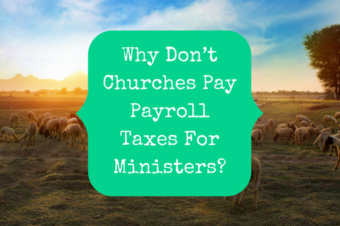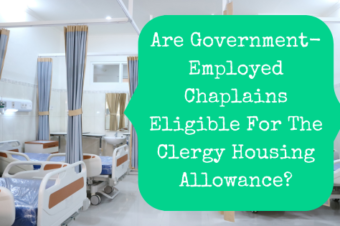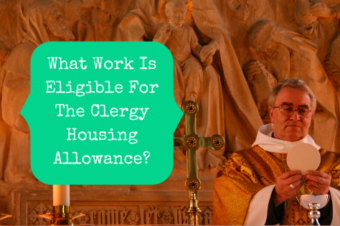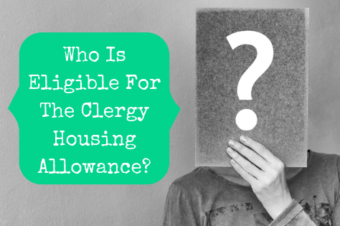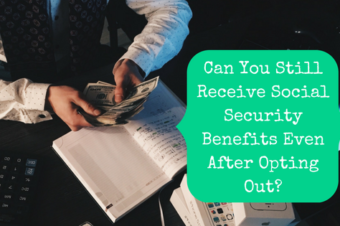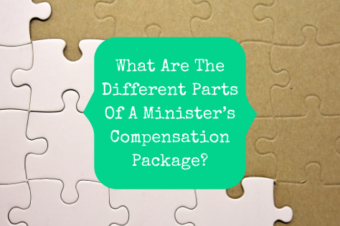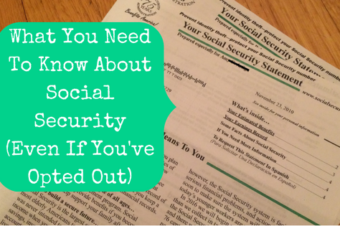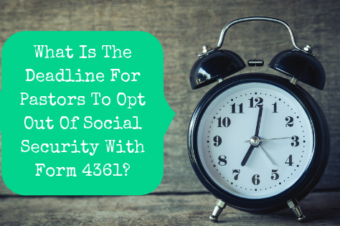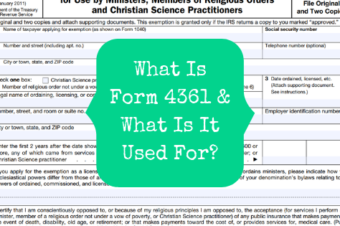Having a baby comes with a lot of responsibility and a long to-do list. Here are the things you should do legally and financially to set yourself up for success once your little one arrives.
What Are The Different Parts Of A Minister’s Compensation Package?
The Apostle Paul told Timothy in 1 Timothy 5:17-18 that “The elders who direct the affairs of the church well are worthy of double honor, especially those whose work is preaching and teaching. For Scripture says, “Do not muzzle an ox while it is treading out the grain,” and “The worker deserves his wages.” (NIV)
I agree. You are worth your wages. But what are your wages?
We commonly think of wages as simply your salary, what you get paid to work. However, compensation can be a whole lot more than just a salary. This is especially true for pastors because of the unique opportunities that you have access to. There are a number of different things that comprise compensation, but they can be broken into two basic categories: income and benefits.
Ministerial Income
Income is actual money that’s coming to you. It’s something tangible that you can put in your bank account.
Salary
A pastor’s salary isn’t much different than anyone else’s salary. It’s money that you get paid for doing a job. You have to pay taxes on the money and you get to do whatever you want with it.
Social Security & Medicare Offset
Pastors are dual-status taxpayers for Social Security purposes and thus have to pay both the employee and employer portions of that tax. If you’re not familiar with that, follow the link in the last sentence or none of this will make sense to you.
Some churches feel bad that pastors have to pay the employer portion of the Social Security and Medicare taxes and want to help them cover the cost. They calculate how much an employer would normally pay for the pastor, 7.65%, and pay that as additional salary. It is a nice gesture and definitely helpful to the pastor. Nevertheless, a Social Security and Medicare offset is simply additional taxable income in the eyes of the IRS.
Housing Allowance
Another type of income unique to ministers is the housing allowance. This site has all kinds of articles related to the housing allowance and I even wrote a book on it.
Basically, the housing allowance is income that is exempt from federal income taxation and can only be used for qualified housing expenses. It is also exempt from most state income taxes as well. Nevertheless, it is not exempt from Social Security & Medicare taxes.
Equity Allowance
The final type of pastoral income is specific to pastors who live in a parsonage. A parsonage is church-provided housing. As such, a pastor who lives in a parsonage does not have the opportunity to build home equity. When the ministry position is gone, the pastor has to start from scratch with housing.
This is the opposite experience for most Americans who purchase a home. As they pay down their mortgage and home values rise, their equity increases. Many people are able to pay off their mortgage by the time they retire so that they have lower housing expenses in retirement and a valuable asset that they can pull equity from if necessary.
Pastors who live in a parsonage often find themselves at retirement homeless and equity-less. To make up for that, many churches pay their pastors an equity allowance to help build towards purchasing a home in retirement. If they pay it directly to the pastor’s retirement account, it receives tax benefits and the pastor cannot access it for other things until retirement. If it is given as a cash payment, it is treated as taxable income by the IRS.
Ministerial Benefits
While income is money that you get, benefits are more of services or products provided to you. They are not cash and will not grow your bank account, but they are still very important to your overall financial life.
Health
One of the most valuable benefits that an employer can provide is health insurance. It is much more expensive to purchase health insurance as an individual than through a group policy. Also, premiums paid through an employer-sponsored health insurance plan are tax-free. Other health-related benefits that churches can provide to all of their employees are dental and vision insurance, health reimbursement arrangements, flexible spending accounts, or health savings accounts if in conjunction with a high-deductible health insurance plan.
Life Insurance
Another benefit that is helpful to both the pastor and the church (because they would want to care for the pastor’s family if anything happened) is life insurance. Up to $50,000 of group term life insurance can be provided tax-free and the premiums on any amounts above that are considered taxable income to the pastor (based on specific IRS calculations).
Disability Insurance
Most pastors are at greater risk of becoming disabled than dying. As such, disability insurance is a very valuable benefit. Like health insurance, it is also much more affordable when purchased as part of a group plan rather than as an individual.
Retirement Savings
A retirement savings account, usually a 403(b), is a benefit that has multiple advantages for pastors. Not only are pastors able to save for retirement pre-tax, but having a church-sponsored retirement plan makes it possible to claim a housing allowance in retirement and also entirely avoid paying Social Security and Medicare taxes on contributions.
Paid Leave
Even God took time to rest. As such, it is important for pastors to have access to paid leave (and a culture where they are encouraged to take it). It can be broken down in different ways, but paid leave can include sick days, holidays, vacation time, family leave, professional development, outside ministry, and sabbaticals. It is also important for the church to respect the pastor’s time off and pitch in to get work done while the pastor is away.
Parsonage
All of the other benefits (not income) listed here can be given to all church staff but a parsonage is only for ordained, licensed, or commissioned ministers. A parsonage is a church-owned home that a pastor gets to live in income tax-free.
Those are the different pieces that can be fit together to create a ministerial compensation package. Both pastors and their churches should understand these different components in order to create a tax-efficient compensation package that meets the pastor’s needs. Pastors, share this with whoever in your church makes salary decisions, whether it’s a board of directors, stewardship committee, an HR department, or whoever. Sit down and review it together to make sure your church is fulfilling 1 Timothy 5 to the best of its ability.
The True Cost Of Opting Out Of Social Security
As soon as they are licensed, many pastors jump at the chance to opt out of Social Security. Social Security taxes total about 15.3% of a pastor’s salary, so opting out represents significant savings. However, there are certain benefits that Social Security provides that must be replaced if you opt out.
Do Pastors Need Disability Insurance?
Today we are going to talk about insurance, which is a favorite topic of conversation for almost no one. In fact, on a recent road trip, my mom wanted to take a quick nap so I listened to a podcast about insurance to help put her to sleep. I’m sure many of you can relate.
Even though insurance isn’t a very exciting topic, it’s an important one. Especially disability insurance, which is what we are talking about today. If you own your home, you likely have homeowners insurance because your mortgage provider requires it and it’s just smart. If you have a car, you surely have it insured, because state law requires it. You’re probably on top of health insurance, even if you are using a medical sharing ministry. Disability insurance, however, is easy to overlook. It isn’t required by law and the people around you aren’t using it on a daily basis. But it’s very important.
The Purpose Of Disability Insurance
What does disability insurance do? It replaces some of your income if you become disabled and can’t work. It helps keep the lights on and some food on the table if you can’t support your family due to a disability. Insurance never replaces ALL of your income, because then you’d have no motivation to recover, but it makes a big difference in your family’s ability to weather a disability.
Does a pastor need disability insurance? It isn’t exactly a dangerous job like a test pilot or deep-sea fisherman. What are the chances that you’re going to get hurt so badly pastoring that you won’t be able to work? Pretty slim.
Common Causes Of Disabilities
Disability isn’t just about accidents, though. It is about sickness and mental health issues, too. In that light, pastors may be at even more risk than test pilots and deep-sea fishermen. A 2016 study found that the top 5 reasons for short-term disability claims are:
- Pregnancy
- Musculoskeletal disorders affecting the back and spine, knees, hips, shoulders, and other parts of the body
- Digestive disorders, such as hernias and gastritis
- Mental health issues including depression and anxiety
- Injuries such as fractures, sprains, and strains of muscles and ligaments
The most common reasons for long-term disability claims are:
- Musculoskeletal disorders
- Cancer
- Pregnancy
- Mental health issues
- Injuries (as described above)
As you can see, pastors face the same risks for most of these disabilities (except pregnancy for males, of course) as people in more physically dangerous occupations. And the risks are real.
Your Chances Of Becoming Disabled
What are your chances of becoming disabled? Greater than you think. The Social Security Administration did a study in 2017 that found that today’s 25-year-olds are more than 4 times as likely to become disabled for at least a year before retirement age (27.2%) than to die without a disability before retirement age (5.9%). For a 54-year-old, the chances are a little higher but the ratio is about the same. And yet everyone talks about life insurance instead of disability insurance.
On average, 5.6% of working Americans will experience a short-term disability of six months or less every year. Most of these disabilities are due to illness, injury, or pregnancy and almost none of these are job-related. Are you convinced of the importance yet? Remember, a 25-year-old has a 27% chance of becoming disabled. That’s more than one out of every four people.
Short-Term Disability Insurance
As I’ve hurled statistics at you, you’ve probably noticed the term “short-term” and “long-term” stuck in front of “disability” from time to time. Any disability that lasts 6 months or less is considered short-term and anything longer is considered long-term. Accordingly, there are insurance policies issued for short-term disabilities and long-term disabilities.
Since I’ve endeavored to impress upon you the risks of disability, you’ll probably be surprised when I say you may not need to own short-term disability insurance. Because of the short-term nature of these disabilities, you may be able to self-insure against them. What does that mean? You can afford a disability without insurance.
I have a 6-month emergency fund, so I would not personally buy short-term disability insurance. If I am disabled for less than 6 months, I have cash in the bank to cover all of my expenses. If I didn’t have that emergency fund, though, it would be wise for me to have short-term disability insurance.
Long-Term Disability Insurance
My emergency fund will only last 6 months, so it’s important for me to have long-term disability insurance. I could cover a 3-month sickness, but not a 3-year battle with cancer. That could bankrupt me.
In fact, studies have found that the leading cause of bankruptcy is medical bills and cancer patients are 2.65 times more likely to file bankruptcy than those without cancer. So, unless you are independently wealthy or have a spouse who can fully support your family financially, you need to look into long-term disability insurance.
Why Disability Insurance Is Especially Important For Pastors
Social Security provides disability benefits, though the majority of applications are denied. If you are approved for benefits, they aren’t very much. In fact, the average monthly Social Security disability payment is just below the poverty line. For one person. It gets farther and farther below the poverty line the bigger your family is.
Even though Social Security disability benefits aren’t impressive, they are at least something. It’s nice to have that to fall back on if you aren’t insured. Unless, of course, you’re a pastor who opted out of Social Security. Then you have nothing to fall back on. Ouch.
Therefore, even if you’re just a pastor who doesn’t do anything dangerous, you need to look into disability insurance. And if you opted out of Social Security, then you REALLY need to look into disability insurance.
Did Opting Out Of Social Security Make You A Hypocrite?
If you’re reading this, you’re probably a licensed minister who has opted out of Social Security. I’ll bet you were thrilled at the opportunity to opt out of a system that is facing a perilous future and is quickly depleting its reserves. But was it really the right move for you? And are you maintaining your integrity by doing so?



